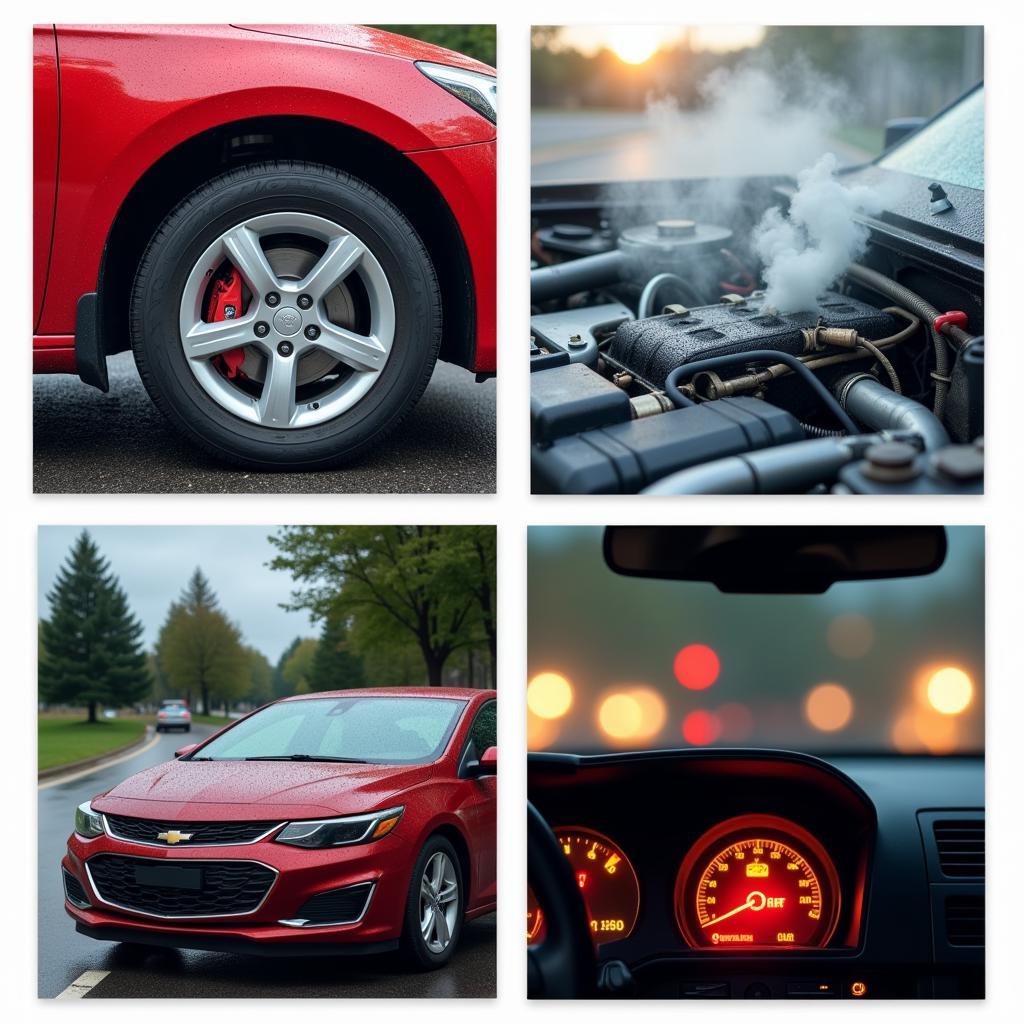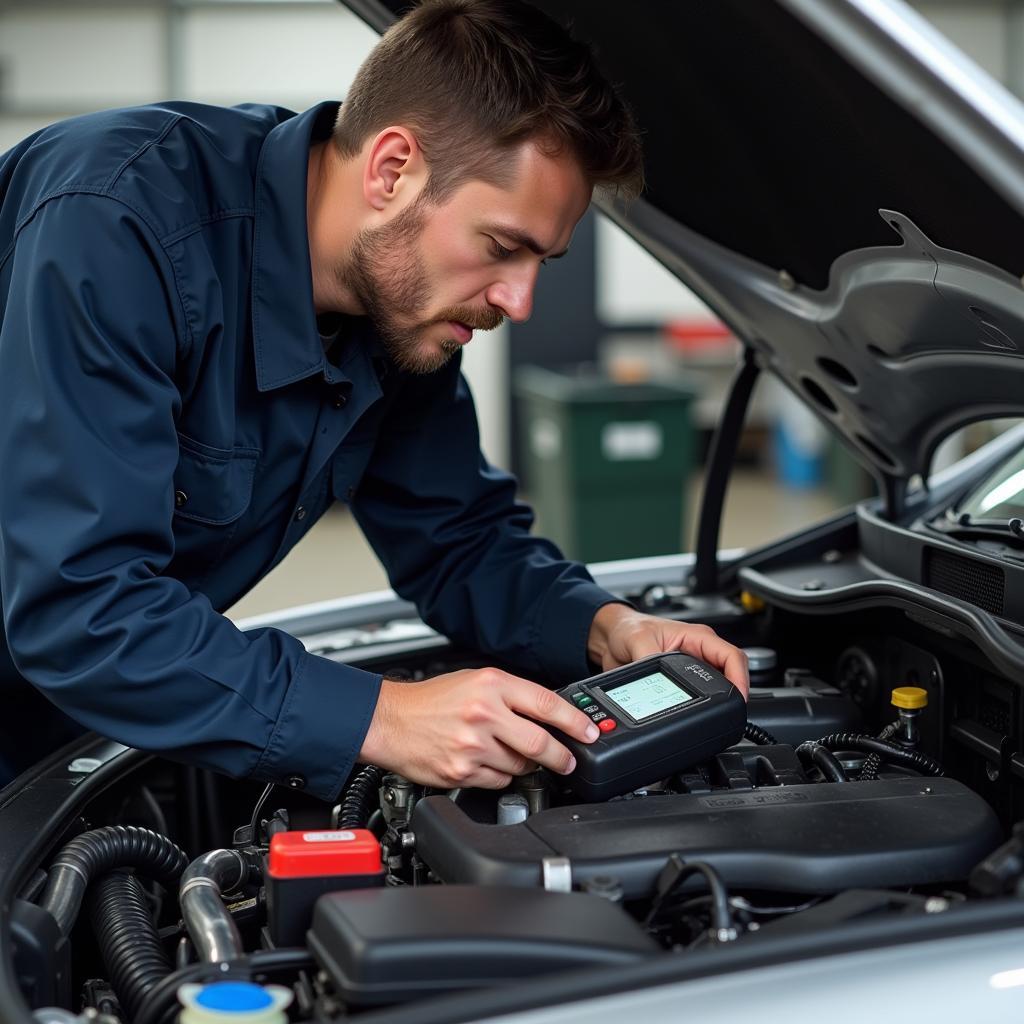Owning a car offers freedom and convenience, but it also comes with the occasional headache of unexpected breakdowns. Don’t worry, this Car Problems Compilation will be your go-to resource for identifying and even fixing some common car troubles. Whether it’s a strange noise, a warning light on your dashboard, or performance issues, understanding the underlying causes can save you time, money, and unnecessary stress.
 Common Car Problems
Common Car Problems
Decoding the Dashboard: Understanding Warning Lights
One of the first signs of car trouble often appears on your dashboard. Those illuminated symbols, while seemingly cryptic, are your car’s way of communicating a potential issue.
- Check Engine Light: This is the most common and often the most dreaded warning light. A steady light might indicate a minor issue like a loose gas cap, while a flashing light suggests a more serious problem requiring immediate attention.
- Battery Light: If this light glows while driving, it suggests your battery isn’t charging properly, often pointing to a failing alternator.
- Oil Pressure Light: This light, often shaped like an oil can, warns of low oil pressure, a critical situation that could lead to severe engine damage if ignored.
- Temperature Warning Light: This light, usually depicted as a thermometer in water, signals that your engine is overheating. Pull over immediately and turn off the engine to prevent damage.
Remember, while this car problems compilation offers some guidance, it’s always best to consult your car’s manual or a qualified mechanic for a proper diagnosis.
Engine Issues: From Stuttering Starts to Stalling
A car’s engine is a complex machine, and when it acts up, the symptoms can range from minor inconveniences to major malfunctions.
- Difficulty Starting: This could be due to a dead battery, a failing starter motor, or even a fuel system issue.
- Rough Idling: If your engine vibrates excessively while idling, it might be due to spark plug problems, clogged fuel injectors, or a vacuum leak.
- Loss of Power: Feeling like your car struggles to accelerate? This could be caused by a clogged air filter, a failing fuel pump, or more serious engine problems.
 Troubleshooting Engine Problems
Troubleshooting Engine Problems
Braking Bad: Identifying Brake Problems
A responsive and reliable braking system is crucial for your safety. Be vigilant about these warning signs:
- Squealing or Grinding Noises: These sounds often indicate worn brake pads, though they can also be a sign of a more serious issue with the brake calipers or rotors.
- Soft or Spongy Brake Pedal: If you have to press the brake pedal further than usual to stop, you might have air in the brake lines or a leak in the braking system.
- Pulling to One Side When Braking: This usually indicates a problem with the brake calipers on one side of the vehicle or uneven brake pad wear.
Beyond the Basics: Other Common Car Problems
This car problems compilation wouldn’t be complete without mentioning some other frequent issues:
- Electrical System Malfunctions: From flickering headlights to a malfunctioning radio, electrical problems can be traced back to faulty wiring, a dying battery, or a faulty alternator.
- Steering Wheel Problems: A stiff steering wheel or a car that veers to one side could indicate power steering fluid leaks or problems with the steering rack.
- Transmission Troubles: Slipping gears, rough shifting, and delayed engagement are all red flags for transmission problems, which can be costly to repair.
For a more in-depth look at specific mechanical issues, you can explore our car mechanical problems compilation long.
Don’t Let Car Troubles Drive You Crazy
While this car problems compilation provides a starting point for identifying issues, remember that it’s crucial to consult with a qualified mechanic for proper diagnosis and repair. Regular maintenance, such as oil changes, tire rotations, and fluid checks, can help prevent many problems and keep your car running smoothly for years to come.
Expert Insight: “Many car owners underestimate the importance of preventive maintenance,” says John Smith, a certified master mechanic with over 20 years of experience. “Regular check-ups can catch minor issues before they escalate into major headaches, saving you both time and money in the long run.”
FAQs: Your Car Problem Questions Answered
1. Why is my car making a clicking noise?
Clicking noises can originate from various sources, such as worn-out CV joints, loose heat shields, or even a simple stone lodged in the tire tread.
2. How often should I change my car’s oil?
While the old adage recommended every 3,000 miles, modern cars often have longer oil change intervals. Consult your owner’s manual for specific recommendations.
3. What should I do if my car overheats?
Pull over immediately to a safe location, turn off the engine, and let it cool down completely before checking the coolant level. Never remove the radiator cap while the engine is hot.
4. Why is my car shaking when I brake?
This is a strong indication of warped brake rotors, a common issue caused by excessive heat and friction.
5. What does it mean if my car is leaking fluid?
The color and location of the leak can offer clues about its source. For instance, clear fluid near the front of the car could be a coolant leak, while reddish-brown fluid might indicate a transmission fluid leak.
6. How can I find a reliable mechanic?
Ask friends, family, or online communities for recommendations. Look for ASE-certified mechanics who are experienced in working on your specific car make and model.
7. How can I prevent future car problems?
The best defense is a good offense. Follow your car’s recommended maintenance schedule, address any warning lights promptly, and don’t ignore unusual noises or changes in your car’s performance.
For a comprehensive look at car problems categorized by year, check out our car problem report by year. Need personalized advice or assistance with a specific car issue? Don’t hesitate to reach out to the experts at AutoTipPro. Contact us at +1 (641) 206-8880 or visit our office at 500 N St Mary’s St, San Antonio, TX 78205, United States. We’re here to help keep you on the road!




Leave a Reply